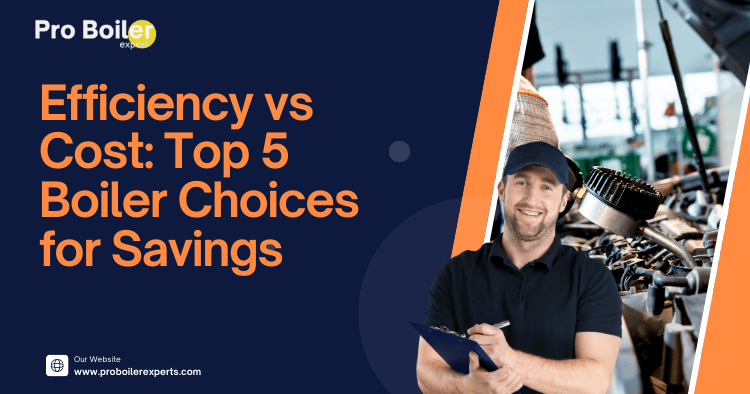Table of Contents
- Introduction
- Understanding Boiler Efficiency
- The Cost Factor in Boiler Selection
- Top 5 Boiler Choices for Savings
- Conclusion
- FAQs
Introduction
When selecting a boiler, the dilemma of balancing efficiency and cost can feel overwhelming. You want to save money while ensuring that your system operates efficiently and meets your heating needs. This article will break down the key aspects of boiler efficiency and cost, introducing you to the top five boiler choices that offer the best savings.
“Choosing the right boiler is not just about the initial price—it’s about the long-term savings and sustainability.”
Understanding Boiler Efficiency
Boiler efficiency measures how well a boiler converts fuel into usable heat. Higher efficiency ratings mean less fuel waste, leading to lower energy costs and a reduced environmental impact. Efficiency ratings are expressed as a percentage (e.g., a boiler that is 90% efficient converts 90% of the energy from fuel into heat).
- Annual Fuel Utilization Efficiency (AFUE): A metric indicating boiler efficiency, representing the amount of heat produced for every dollar of fuel consumed. A higher AFUE signifies greater efficiency.
- Energy Star Ratings: Boilers that earn the Energy Star label meet strict energy efficiency guidelines set by the U.S. Environmental Protection Agency (EPA).
For a comprehensive overview of boiler efficiency, check out the U.S. Department of Energy.
“A small increase in efficiency can lead to substantial savings over time.”
The Cost Factor in Boiler Selection
When considering a boiler’s cost, it’s crucial to factor in both initial purchase price and long-term operational costs. While a cheaper boiler may seem appealing initially, it might lead to higher energy bills and maintenance costs in the long run.
- Initial Costs: This includes the purchase price of the boiler and installation costs.
- Operational Costs: Ongoing costs such as fuel, maintenance, and repairs.
- Return on Investment (ROI): A more efficient boiler may have a higher upfront cost but can save you money over time through lower energy bills.
“Investing in a more efficient boiler may require a larger initial outlay, but the long-term savings can be significant.”
Top 5 Boiler Choices for Savings
1. Condensing Gas Boilers
Condensing gas boilers are among the most efficient options available today. They utilize advanced technology to recover heat from exhaust gases, achieving efficiency ratings of up to 98%.
For more information on the benefits of condensing boilers, visit Top 5 Benefits of Condensing Boilers.
| Feature | Details |
|---|---|
| Efficiency | Up to 98% AFUE |
| Fuel Type | Natural gas |
| Initial Cost | Moderate |
| Operational Cost | Low due to high efficiency |
| Ideal for | Homes with existing gas lines |
Pros: High efficiency, lower emissions, and reduced energy costs.
Cons: Higher upfront cost compared to traditional boilers.
“Condensing gas boilers are truly a win-win for both your wallet and the environment.”
2. Oil Boilers
Oil boilers are a reliable choice for many homeowners, especially in rural areas where natural gas is unavailable. Modern oil boilers can achieve efficiencies of around 85%.
For more insights on oil boilers, check out Top 5 Benefits of Choosing Oil Boilers for Your Home.
| Feature | Details |
|---|---|
| Efficiency | Up to 85% AFUE |
| Fuel Type | Heating oil |
| Initial Cost | Moderate to high |
| Operational Cost | Moderate |
| Ideal for | Rural homes, colder climates |
Pros: High heat output, effective in very cold climates.
Cons: Fluctuating oil prices can make operational costs unpredictable.
“While oil boilers offer strong performance, they come with the caveat of volatile fuel prices.”
3. Electric Boilers
Electric boilers are compact and easy to install, making them a popular choice for smaller homes or apartments. They typically have efficiencies of around 99%, converting nearly all energy to heat.
For a deeper dive into electric boilers, you can refer to Electric Boilers: Key Pros and Cons You Should Know.
| Feature | Details |
|---|---|
| Efficiency | Up to 99% AFUE |
| Fuel Type | Electricity |
| Initial Cost | Low to moderate |
| Operational Cost | High (depending on local rates) |
| Ideal for | Smaller homes, limited spaces |
Pros: Low maintenance and high efficiency.
Cons: Higher energy costs depending on electricity rates.
“Electric boilers shine in efficiency, but local electricity prices can impact overall cost-effectiveness.”
4. Biomass Boilers
Biomass boilers are an eco-friendly alternative that burns organic materials like wood pellets or chips. They can achieve efficiencies of up to 90%.
Explore more about biomass options in Top 5 Benefits of Biomass Boilers for Eco-Friendly Heating.
| Feature | Details |
|---|---|
| Efficiency | Up to 90% AFUE |
| Fuel Type | Biomass (wood pellets, chips) |
| Initial Cost | Moderate to high |
| Operational Cost | Low (if sourcing locally) |
| Ideal for | Eco-conscious homeowners |
Pros: Sustainable energy source, reduced carbon footprint.
Cons: Requires regular maintenance and fuel storage.
“Biomass boilers not only provide heat but also contribute to a greener planet.”
5. Heat Pumps
Heat pumps are versatile and can provide both heating and cooling. They work by transferring heat rather than generating it, often achieving efficiencies of 300-400%.
For more guidance on heat pumps, check out Top 5 Benefits of Smart Boilers Revolution
Conclusion
Choosing the right boiler involves balancing efficiency and cost. By considering your specific situation and the options available, you can make an informed decision that saves you money in the long run. Whether you opt for a condensing gas boiler, an oil boiler, or even a heat pump, each option has unique benefits that can lead to significant savings.
“In the world of heating, informed choices pave the way for both comfort and savings.”
FAQs
- What is the most efficient boiler type?
Condensing gas boilers generally offer the highest efficiency, with AFUE ratings up to 98%. - How can I reduce my boiler’s operational costs?
Regular maintenance, using a programmable thermostat, and ensuring proper insulation can help reduce operational costs. - Are electric boilers more cost-effective than gas boilers?
It depends on local electricity and gas prices. While electric boilers are highly efficient, they can be more expensive to operate in areas with high electricity rates. - What is the lifespan of a boiler?
Most boilers have a lifespan of 10 to 15 years, but proper maintenance can extend their life. - How do I know if my boiler is efficient?
Check the AFUE rating and consider having a professional energy audit conducted to assess your boiler’s efficiency.
We hope this guide helps you navigate your boiler choices with confidence. Remember, investing in an efficient boiler can lead to significant long-term savings, making it a wise decision for your home!





